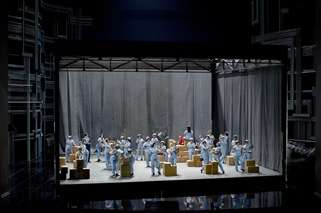|
Back
Anchors Aweigh! (Or is it Away?) Bayreuth
Bayreuther Festspiele
07/25/2012 - & July 31, August 6*, 18, 24, 2012
Richard Wagner: Der fliegende Holländer
Samuel Youn (the Dutchman), Adrianne Pieczonka (Senta), Franz-Josef Selig (Daland), Michael König (Erik), Christa Mayer (Mary), Benjamin Bruns (Steersman)
Bayreuther Festspiele Orchestra and Chorus, Christian Thielemann (conductor)
Jan Philipp Gloger (director), Christof Hetzer (sets), Karin Jud (costumes)

(© Enrico Nawrath)
A new production in Bayreuth is always fertile ground for controversy, usually because of some weird element in the staging. This year’s new production, of Wagner’s earliest “mature” work, was dogged by scandal even before the curtain went up. Just days before the premiere, the long announced star baritone Evgeny Nikitin suddenly withdrew under administrative pressure after it was revealed that youthful videos on the internet showed him sporting a swastika tattoo on his chest. Nevertheless, the questionable tattoo, as publicity photos reveal, had long been covered by another one. The Dutchman’s costume would not have revealed any tattoos had he gone on in the production. Stefan Herheim’s currently running production of Parsifal, moreover, uses swastika flags quite vividly. But none of this mattered. Nikitin was out. He did not help his side of the story by changing his reaction from a simple apology to a doubtful claim that he did not know the swastika was offensive to an even more dubious assertion that the tattoo was not a swastika at all. Regardless, the controversy really was much ado about nothing, and for the record Nikitin is a fine Dutchman (he has sung the role in St. Petersburg’s Mariinsky Theater). We can hope he returns to Bayreuth one day, no matter what tattoos he may once have had.
It was fortunate that Bayreuth had the excellent German-trained Korean bass-baritone Samuel Youn on hand to replace the hapless Nikitin. Possessing a cool, rich legato, Youn achieved a considerable success for which he deserves much praise. There were a few rough edges to be sure, but the character almost demands them if the Dutchman’s spectral despair is to come through convincingly. Adrianne Pieczonka’s Senta was less fortunate. The essential ballad, which introduces the girl’s obsession with the legendary and damned captain, sounded thin and at times rather forced. She floated a few sublime notes in the duet, but inconsistent ascents left the overall effort uneven. Franz-Josef Selig was a stentorian Daland, though his low notes came out a bit muddy. Benjamin Bruns and Michael König ably rounded out the cast as the Steersman and Senta’s hapless suitor Erik.
Christian Thielemann led a superb orchestral performance, displaying enormous energy and an electric vitality along with an almost superhuman aptitude for keeping the sound plush throughout nearly two and a half hours of continuous music.
The young director Jan Philip Gloger cannot be credited with tremendous inspiration in his presentation of this stormy tale. Like so many productions of this opera, he has reduced it to a modern legend of soulless capitalist materialism. The tortured Dutchman makes his entrance in the de rigueur business suit, toting a wheeled carry-on suitcase and a disposable coffee. As he so often does in houses in Germany and elsewhere, he looked like any poor white collar stiff trudging through the Frankfurt airport. His suitcase is of course filled with US dollars. Senta’s father Daland is the predictable corporate executive, attended by a puppy dog-like Steersman, whose short aria about his beloved involves him producing a chic dress with a visible price tag instead of the golden band his song tells us he wants to give his sweetheart. Daland’s office worker “sailors” repeat this action en masse when they sail off to shore. Senta and the Act II maiden’s chorus pack and ship cardboard boxes carrying electric fans. This is almost clever since their chorus calls for “spinning,” but the major dramatic effect was to make spectators in the hot and stuffy Festspielhaus wish they had one. The stage action of the third act chorus looks like a corporate pep talk, in which the lickspittle Steersman smilingly extols the simple fan’s virtues. At the end of the opera, the factory switches over to making and packaging a new corporate product: table lamps with figurines of the presumably redeemed (or just dead) Dutchman and Senta in their final suicidal embrace, which comes after Senta stabs herself with a pair of scissors. At least she does not slash her throat with them, as in other German productions, but the method was again disappointingly predictable.
The production was not without some originality. Christof Hetzer’s set opens the action with a blazing computer mainframe that dominates the stage. When the mood is stormy, its neon lights sputter along and display blinking zeroes on screens that recall modern stock exchanges. When the action is moving forward, however, the installation hums along with steadily rising figures in the register. It seemed that so much more could have been done with this, but the confined and rather clichéd concept may not have allowed for much else.
Paul du Quenoy
|